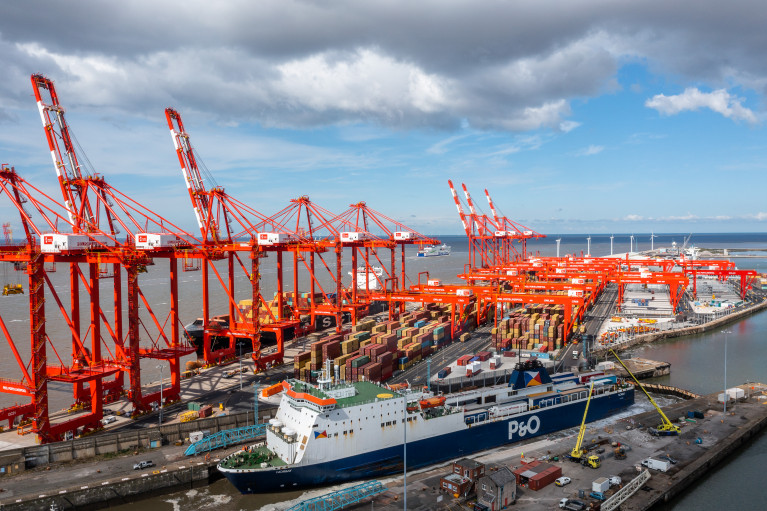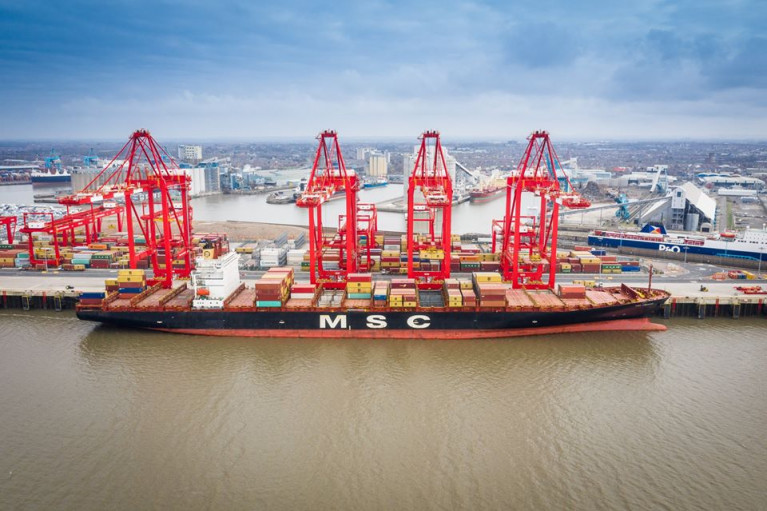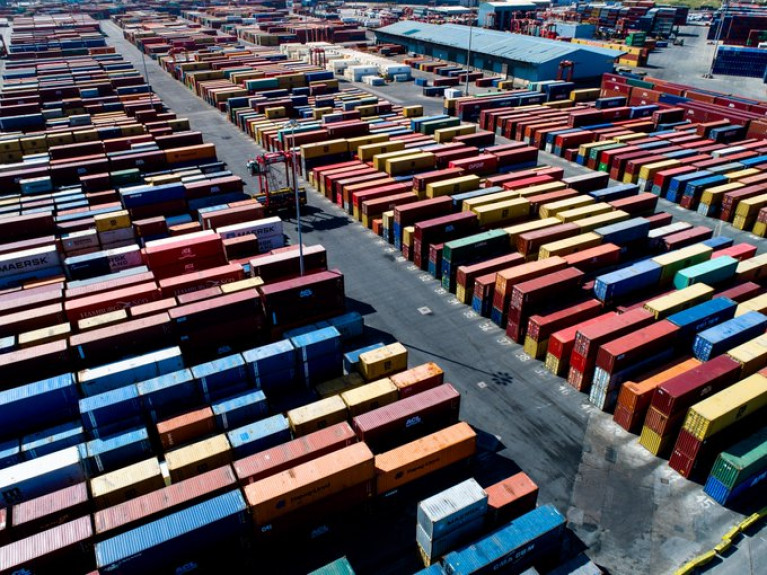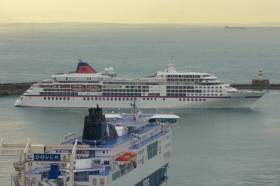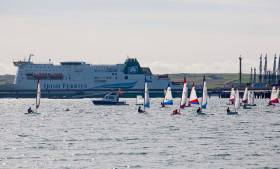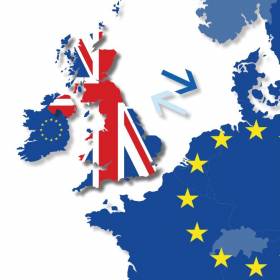Displaying items by tag: British Ports Assoc
Welsh Port Wins Sustainability Award at British Ports Association's Conference in Scotland
The south Wales Port of Milford Haven has won the Port Sustainability Award at the British Ports Association’s Conference which was held recently in Aberdeen.
Recognising ports for their sustainability credentials, the award highlights the Port of Milford Haven’s commitment not only to environmental sustainability, but also its work to improve the sustainability of the communities surrounding the Port.
Among the examples given that demonstrated this were the Port’s collaboration with the Milford Haven Energy Kingdom project which delivered the world’s first smart hydrogen hybrid system in a commercial setting; a community engagement initiative which resulted in a music video performed by school pupils highlighting exciting opportunities for them in imminent renewable energy developments locally; the purchase of a fleet of electric vehicles and the Coastal Communities Adapting Together (CCAT) project.
At the start of the year, the Pembrokeshire port launched a dedicated Green Energy Fund that supports local charitable organisations and other not-for-profit organisations to improve their environmental sustainability.
A stand-out initiative established by the Port is the formation of Milford Haven Waterway Future Energy Cluster - a coalition of energy companies, renewable developers, green technology innovators and the local council. Together, the Cluster has set a low carbon vision for the Milford Haven Waterway to support UK Net Zero ambitions.
The Port also made a commitment in 2022 to the Real Living Wage. In addition, it introduced a ‘Community Benefits’ section to procurement procedures, asking all tenderers to outline how they will provide community benefits whilst working for the Port.
Chris Martin, Chairman, said: “We are unbelievably proud of all the work the team has put into ensuring sustainability is ingrained in everything we do. The Port is led by a team of local people who are fully immersed in the community and are passionate about making a positive difference. I am personally very proud of all the work they have accomplished in recent years and look forward to what the future may bring.”
The port's CEO Tom Sawyer added: “Winning this award is a great achievement for the whole team. When we introduced Sustainability as a core value, we were dedicating ourselves to working harder than we already were to promote this in the community. Sustainability isn’t just for the environment, it is for jobs, communities, and society. We are very proud to have been given this recognition by the British Ports Association.”
The ports industry in the UK has described as “unworkable” ministers’ plans to ask port operators to block ferries with crews paid less than the minimum wage, the government’s signature policy response to outrage over the sacking of 800 workers without consultation by P&O Ferries.
The transport minister, Grant Shapps, told parliament on Wednesday that the government would write to the operators of British ports telling them to refuse access to companies that did not pay the UK minimum rate, in a move explicitly addressed at P&O.
He also outlined plans to create “minimum wage corridors” on ferry routes between the UK and Denmark, France, Germany and Ireland.
However, the ports industry immediately said it would be unable to carry out Shapps’s policy.
Richard Ballantyne, the chief executive of the British Ports Association, said: “While it’s right the government and the ferry industry look to improve employment rules and standards, the expectation that port authorities will need to enforce minimum wage rules in the shipping sector could be unworkable. This will place ports in a difficult legal predicament, especially before any legislation is in place.
The RMT union, which represents ship workers, said it was “too little, too late”, and questioned whether the move would do anything to force P&O Ferries to reinstate the workers, many of whom are thought to have been paid more than the UK minimum wage before they were sacked.
More from The Guardian on the BPA's response to the UK government's proposal.
British Ports Association Calls for Clarity on UK Freeport Model
In the UK, the HM Revenue and Customs have published guidance for ‘Operating a Freeport customs site’, or ‘free zone’ for the eight winning bids in England, which were designated Freeport status last March.
The British Ports Association (BPA) has been supportive of the concept of Freeports across the UK and believes they can be a force for immense good, so has welcomed the guidance.
However, it said that since the winning English bids were announced before any agreement on Freeports in the devolved administrations, there have been legitimate fears amongst ports that they will be left behind.
Phoebe Warneford-Thomson, BPA Policy Manager and Economic Analyst, said: “It is indeed welcome to see the detail on the operation of a UK Freeport to continue to be carved out and to see the swift progression of the Freeports in England up to their launch in the coming months.
LloydsLoadingList has more
Ports Association in UK Welcome Freeports Milestone
Ports in the UK represented by the British Ports Association (BPA) today welcomed the launch of the bidding process and the publication of the bidding prospectus for Freeports in England.
According to the BPA they have been promoting a port zoning economic vision that supports regional growth and prosperity akin to the Freeports strategy for several years.
This stage represents a key step forward to the establishment of a more advanced model Freeports than previously seen. However inclusivity and consistency around the UK is still something policy makers need to consider to ensure all regions can benefit.
The British Ports Association, the national association for all types of ports, harbours and terminals, speaks for over 400 ports, terminals and port facilities. BPA membership facilitates 86% of all UK port trade and handles 85% of all vessel arrivals in the UK.
The BPA has championed the value of port clusters as a way of driving economic growth in coastal regions. Since the UK Government’s announcement of the establishment of 10 Freeports in the Summer of 2019, the BPA has argued that the Government must prioritise the principles of inclusivity, competition and fairness when forging the policy.
The BPA welcomed recent suggestions that the Treasury would consider the establishment of more than 10 Freeports in the event they receive a large number of high-quality proposals.
More here on the development from the BPA and their Chief Executive Richard Ballantyne.
British Ports Association Respond to New Brexit Deal
On the concluding day of the British Ports Association conference in Belfast as previously reported on Afloat, the BHA and UK Major Ports Group (UKMPG) have responded to the latest EU withdrawal agreement currently awaiting parliamentary approval.
Under the latest deal, Ports Strategy reports, that Northern Ireland will officially be part of the UK’s customs territory but with an EU/UK customs border in the Irish Sea, meaning that, de facto, NI follows the EU's customs rules. UK customs authorities will check goods at British (ferry)ports before they enter NI and ensure tariff-free passage provided the final destination remains NI. The Democratic Unionist Party has refused to back the new agreement.
Richard Ballantyne, chief executive of the BPA, has cautiously welcomed the news. “There remains some fundamental issues for ports across Britain and Ireland to manage,” he said.
“We have repeatedly warned that a no-deal Brexit would be unacceptable and we now look forward to a more orderly process and reiterate our view that a future relationship should prioritise the flow of trade at our frontiers. The trade between the island of Ireland and Great Britain is important and particularly that between Northern Ireland and Britain,” he added.
More here on the Brexit Deal development.
Inaugural Maritime UK Awards to Be Held During Southampton Boat Show
Recently announced were the finalists for the inaugural Maritime UK Awards which will be held next month during the Southampton Boat Show.
According to the British Ports Association (BPA) the winners will be announced in front of 400 of the industry’s finest at a ceremony in Southampton on Thursday 19 September.
Included in the list of finalists are a number of UK ports among them Afloat adds the Port of Dover as previously reported.
The awards focus on a wide range of areas including business growth, innovation, sustainability, diversity, education and the future.
The finalists from the ports sector are as follows:
• Port of Dover for the International Trade Award - awarded to businesses that are actively involved in international trade and have significantly increased their import/export activity or attracted Foreign Direct Investment
• Port of Cromarty Firth, Port of Dover and Associated British Ports for the Sustainability Award - awarded to organisations that demonstrate exceptional true commitment to sustainability
• Port of Tyne for the 2050 Award - awarded to businesses that are taking steps to capitalise upon the opportunities presented within the Government’s Maritime 2050 strategy launched earlier this year
• Port of Cromarty Firth for the Coastal Powerhouse Award - awarded to those organisations that have proven themselves as a driver or catalyst for growth within a coastal community
British Ports Association members Royal Haskoning and Hill Dickinson are also both finalists for the Employer of the Year Award.
Commenting on yesterday’s announcement, Sara Walsh, Corporate Services Manager at the British Ports Association said: “We are delighted to see a number of UK ports being shortlisted in the first ever Maritime UK Awards. The ports industry plays a vital role in our economy, facilitating over 95% off the UK’s international trade. As demonstrated by the number of ports who are finalists for the Awards, the sector provides important hubs of regional and nationally significant economic activity and employment, often in areas of deprivation.
To see all three finalists of the Sustainability Award being ports (Port of Cromarty Firth, Port of Dover and Associated British Ports) is a testament to the UK ports sector and what we have achieved to deliver a true commitment to improve sustainability. We are continuing to advise on how Government can work with industry to deliver further improvements and we are committed to supporting sustainability and decarbonisation, having produced our first Sustainability Charter last year.
According to the British Ports Association they have welcomed the UK's Government’s announcement of “up to 10 new freeports”
(Noting Afloat adds see related story on the Irish Sea Port of Holyhead, Wales).
The BPA has developed ambitious complementary Port Enterprise and Development Zone proposals.
Commenting on the announcement, BPA's chief executive Richard Ballantyne said: “We are pleased that Ministers recognise the vital economic role that ports play and we are keen to explore with the Government how this can be boosted further. We also welcome additional focus on how ports can further support national and regional economies.
Many of the benefits of a traditional ‘free port’ can be achieved in the UK through existing processes, but we look forward to working with Government on how a UK-specific model can boost sustainable development in and around ports and add real value.
The British Ports Association is working with ports and airports on ambitious complementary proposals for ‘Port Enterprise & Development Zones’ that will support economic activity across a much wider range of ports all across the UK. These proposals contain a series of recommendations around planning, enterprise and the tax system that could be incorporated into or sit alongside a UK freeport model. As well as Teesport, ports like the Tyne, also in England and the Port of Milford Haven, Wales (see Afloat's related coverage) are at an advanced stage in looking at such options.
The potential selection of 10 UK Free Port sites could be transformational for some locations but three will need to be some balance to ensure that this ports which don’t have status are not disadvantaged. Having Free Port status could be a beneficial marketing asset which helps attract inward investment and the Government will need to satisfy itself that this is not at the expense of other UK locations. That’s why we are proposing the wider concept of a Port Zone status, alongside the Free Port proposals, at all UK Ports might be a way to encourage the industry to grow cohesively.
It will be important that any Free Port designations are industry led. The newly formed advisory Department for International Trade's Panel should therefore take a bottom up approach and avoid where possible political pressures.
Ports are also important economic hubs in their own right and are often the centre of broader economic landscape. Many businesses recognise the economic and environmental benefits of being based in and around UK ports. Ports are gateways for 95% of the UK’s international trade but are also the foundation of the wider marine economy including everything from offshore wind to marine recreation and tourism.“
Alongside the well publicised Teesport proposals other ports are pursuing free port proposals, as noted by the Department for International Trade’s press release, including the Port of Tyne in addition to Milford Haven.
At the Port of Tyne a site could support advanced manufacturing through a multiple site designation a ‘virtual free port’ which could include local manufacturers such as Nissan as Afloat previously reported regarding Brexit.
In Pembrokeshire around the UK’s largest energy port, Milford Haven, a port zone could support the oil and gas cluster, promote reshoring of some fish processing and bolster marine energy generation deployment.
#Ports&Shipping - Following the recent publication of the UK Government’s advice on contingency planning for a ‘no deal’ Brexit outcome, the British Ports Association (BPA) has suggested that negotiators have it in their power to agree a deal that would end months of uncertainty regarding the future arrangements at UK and EU borders.
Highlighting the merits of the UK Government’s proposal agreed at Chequers and subsequently set out in the Brexit White Paper in July, the BPA is urging both sides to rally and agree.
According to the BHA's Chief Executive Richard Ballantyne said: “The paper underlines the implications of a ‘no deal’, in terms of trading arrangements at ports. While it is sensible that the Government considers all outcomes we are hopeful that both sides will want to ensure that ports are free flowing on day one.
For parts of the ports industry, namely Roll-on Roll-off port operations, which handle the majority of the UK’s trade with the EU, a ‘no-deal’ could be a serious challenge and lead to significant disruption at the border. The Chequers agreement and the Government’s Brexit White Paper proposals offered a solution to the challenge of possible new customs and borders checks, which to date appears to be the only viable option. We would urge Michel Barnier and his colleagues to seriously consider this proposal. Without agreement the fluidity of tens of thousands of freight vehicles which travel between the UK and the EU on a daily basis is at stake. It is vital that we get this right. Over the last two years we have had productive discussions with the UK Government on Brexit and we do feel that UK officials have crafted a viable plan which with some preparation would work for both sides. This would mean we avoid the significant disruption that may occur at certain ports that are important international gateways for both the UK and the EU.”
Leaving the EU Customs Union and Single Market means that without some form of agreement goods travelling to and from Europe will be subject to new authorisations and other requirements as of March 2019. Included in the UK Government’s ‘no-deal’ advice is that traders will need to undertake new border processes which could be most challenging for freight on lorries travelling through ‘roll-on roll-off’ ferry port gateways. These are ports such as Dover, Holyhead, Immingham and Portsmouth and Ro-Ro ports collectively facilitate the majority of the UK’s EU trade. There will of course be opportunities for IT solutions for customs procedures but these could take time and all those in the logistics chain will need to assess how they will meet the new arrangements.
For most other types of ports handling bulks and containerised cargo, the likely new customs procedures should be relatively straightforward to achieve. However there are still questions around other frontier inspections such as port health standards which are mandated under EU law and without agreement will be difficult to overcome, particularly in respect of the UK’s exports through the EU.
The UK Government’s ‘no-deal’ advisory notices on trading with the EU can be read or downloaded by clicking here.
Afloat adds the Irish Maritime Development Office (IMDO) also has the full document (PDF download) from the EU Commission on preparing for the withdrawal of the UK from the European Union. Also for more related coverage, click here.



























